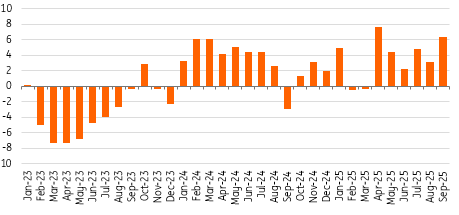
Image Source: Pexels
Although September retail sales growth fell short of expectations due to weak food sales, the sector still performed strongly thanks to robust durable goods demand. When combined with solid industrial production and construction data, along with anticipated strength in services, this supports our projection of 4%YoY growth for 3Q25.
Retail sales of goods rose by 6.4% year-on-year in September (ING: 8.0%; consensus: 6.8%) following a 3.1% YoY increase in August. The strong annual growth was supported by a low base from September last year, when the southern part of the country was dealing with the aftermath of flooding, and retail sales contracted by 5.7% month-on-month. However, the scale of improvement this September was below our expectations. Seasonally adjusted data indicate a 0.6% month-on-month decline in sales.
Low base from last year contributed to high retail sales growth in September 2025
Retail sales (real), %YoY (NSA)

Source: GUS
The main source of the lower-than-expected growth in sales was food, which saw an increase of just 0.2% YoY. Double-digit growth was reported in textiles, clothing and footwear (20.5% YoY), furniture, consumer electronics and household appliances (16.6% YoY), as well as cars, motorcycles and parts (15.0% YoY). This reflects not only the low base from last year, but also a continuation of the trend observed in previous months.
Durable goods sales expand at a double-digit pace
Retail sales (real), %YoY (NSA)

Source: GUS
The September data set from the real economy – comprising industrial production, construction and assembly output, and retail sales – paints a solid picture of the end of that third quarter. The results were broadly in line with consensus (retail sales) or better (industrial and construction output). We maintain our forecast for GDP growth in 3Q25 at 4.0% YoY, and for the full year, we expect economic growth to be around 3.5%.
The main drivers remain the services sector and rapidly expanding consumption, which is set to grow faster this year than in 2024, despite a slower increase in the real disposable household income. Consumer sentiment is improving, and households appear more willing to spend, no longer accumulating savings to the same extent as in 2024. The strong set of September data calls for the MPC to refrain from easing in November.
More By This Author:
FX Daily: UK Inflation Puts December Rate Cut Back On The Table The Commodities Feed: Profit Taking Hits Gold LME Week Takeaways: Metals Find Their Footing
Disclaimer: This publication has been prepared by the Economic and Financial Analysis Division of ING Bank N.V. (“ING”) solely for information purposes without regard to any ...
more
Disclaimer: This publication has been prepared by the Economic and Financial Analysis Division of ING Bank N.V. (“ING”) solely for information purposes without regard to any particular user's investment objectives, financial situation, or means. ING forms part of ING Group (being for this purpose ING Group NV and its subsidiary and affiliated companies). The information in the publication is not an investment recommendation and it is not investment, legal or tax advice or an offer or solicitation to purchase or sell any financial instrument. Reasonable care has been taken to ensure that this publication is not untrue or misleading when published, but ING does not represent that it is accurate or complete. ING does not accept any liability for any direct, indirect or consequential loss arising from any use of this publication. Unless otherwise stated, any views, forecasts, or estimates are solely those of the author(s), as of the date of the publication and are subject to change without notice.
The distribution of this publication may be restricted by law or regulation in different jurisdictions and persons into whose possession this publication comes should inform themselves about, and observe, such restrictions.
Copyright and database rights protection exists in this report and it may not be reproduced, distributed or published by any person for any purpose without the prior express consent of ING. All rights are reserved. ING Bank N.V. is authorised by the Dutch Central Bank and supervised by the European Central Bank (ECB), the Dutch Central Bank (DNB) and the Dutch Authority for the Financial Markets (AFM). ING Bank N.V. is incorporated in the Netherlands (Trade Register no. 33031431 Amsterdam). In the United Kingdom this information is approved and/or communicated by ING Bank N.V., London Branch. ING Bank N.V., London Branch is deemed authorised by the Prudential Regulation Authority and is subject to regulation by the Financial Conduct Authority and limited regulation by the Prudential Regulation Authority. The nature and extent of consumer protections may differ from those for firms based in the UK. Details of the Temporary Permissions Regime, which allows EEA-based firms to operate in the UK for a limited period while seeking full authorisation, are available on the Financial Conduct Authority’s website.. ING Bank N.V., London branch is registered in England (Registration number BR000341) at 8-10 Moorgate, London EC2 6DA. For US Investors: Any person wishing to discuss this report or effect transactions in any security discussed herein should contact ING Financial Markets LLC, which is a member of the NYSE, FINRA and SIPC and part of ING, and which has accepted responsibility for the distribution of this report in the United States under applicable requirements.
less
How did you like this article? Let us know so we can better customize your reading experience.






